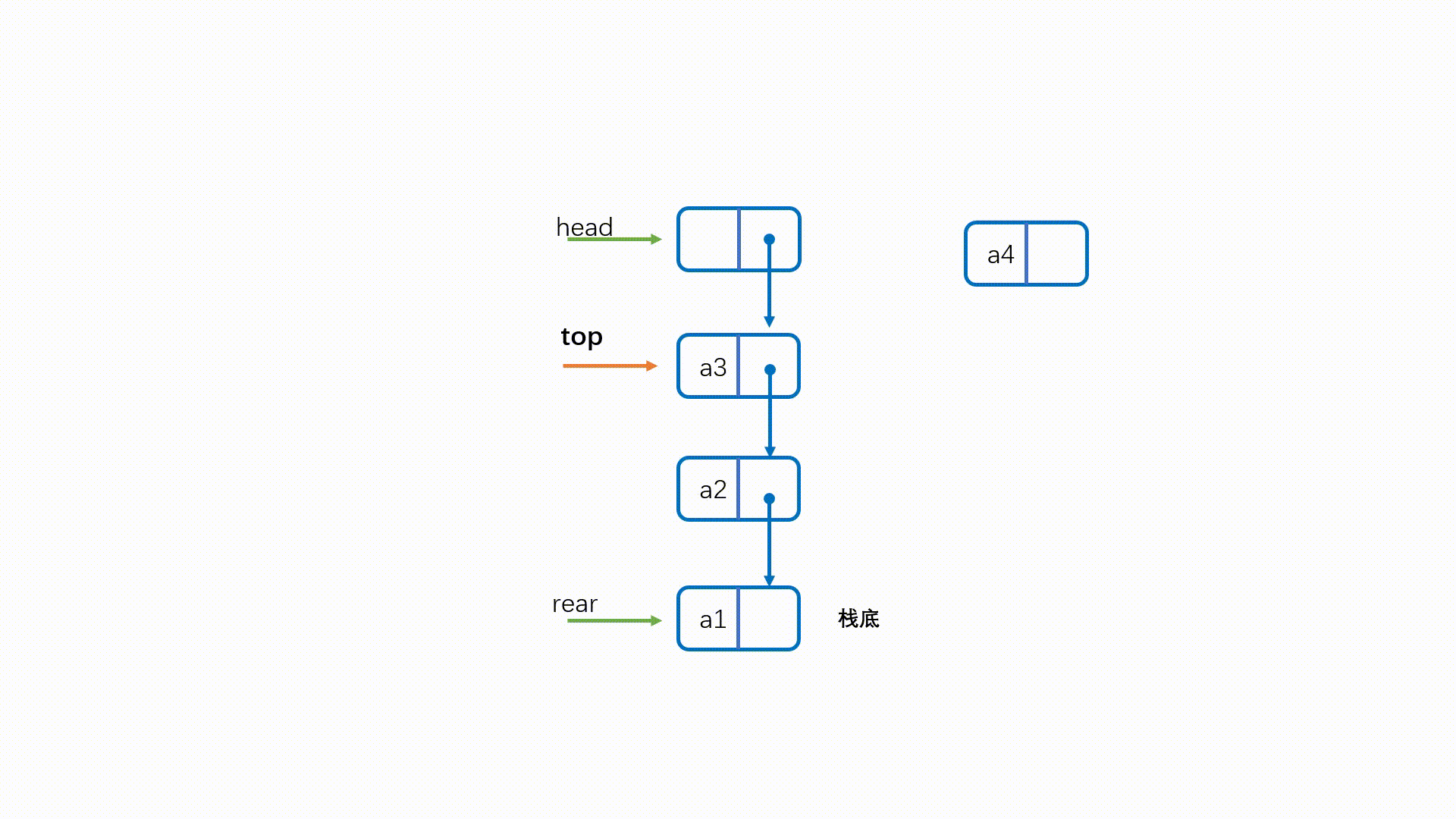🎈前言
这篇文章男女通用,看懂了就去给异性讲吧。



🎈什么是栈
可以把栈当成是弹夹,只能从栈顶放入数据和取出数据,而且每次取出的时候都是从栈顶取,先进后出后进先出
🎈动图演示栈
🎈链表实现栈:

🎈线性表实现栈:


🎈栈的具体实现
🎈stak.h 定义函数,结构体,所需要的头文件
1
2
3
4
5
6
7
8
9
10
11
12
13
14
15
16
17
18
19
20
21
22
| #pragma once
#include<stdio.h>
#include<stdlib.h>
#include<assert.h>
#include<stdbool.h>
typedef int STDataType;
typedef struct Stack
{
STDataType* a;
int top;
int capacity;
} ST;
void StackInit(ST*ps);
void StackPush(ST* ps, STDataType x);
void StackPop(ST*ps);
int StackSize(ST*ps);
bool StackEmpty(ST* ps);
STDataType StackTop(ST* ps);
void Destroy(ST* ps);
|
🎈stack.c实现函数
🎈 StackInit(ST*ps);//初始化栈
1
2
3
4
5
6
7
8
| void StackInit(ST* ps)
{
assert(ps);
ps->a = NULL;
ps->top = 0;
ps->capacity = 0;
}
|
🎈StackPush(ST* ps, STDataType x);//入栈
1
2
3
4
5
6
7
8
9
10
11
12
13
14
15
16
17
18
19
| void StackPush(ST* ps, STDataType x)
{
assert(ps);
if (ps->top == ps->capacity)
{
int newCapacity = ps->capacity == 0 ? 4 : (ps->capacity * 2);
ps->a = (STDataType*)realloc(ps->a, sizeof(STDataType) * newCapacity);
if (ps->a == NULL)
{
printf("realloc fail\n");
exit(-1);
}
ps->capacity = newCapacity;
}
ps->a[ps->top] = x;
ps->top++;
}
|
🎈StackPop(ST*ps);//出栈
1
2
3
4
5
6
7
| void StackPop(ST* ps)
{
assert(ps);
assert(ps->top > 0);
--ps->top;
}
|
🎈StackSize(ST*ps);//栈中数据的数量
1
2
3
4
5
6
| int StackSize(ST* ps)
{
assert(ps);
return ps->top;
}
|
🎈StackEmpty(ST* ps);//判断栈是否为空
1
2
3
4
5
6
7
| bool StackEmpty(ST* ps)
{
assert(ps);
return (ps->top == 0);
}
|
🎈StackTop(ST* ps);//栈顶元素
1
2
3
4
5
6
7
8
| STDataType StackTop(ST* ps)
{
assert(ps);
assert(ps->top > 0);
return ps->a[ps->top - 1];
}
|
🎈Destroy(ST* ps);//销毁栈
1
2
3
4
5
6
7
| void Destroy(ST* ps)
{
assert(ps);
free(ps->a);
ps->top = ps->capacity = 0;
}
|
🎈stack.c完整代码
1
2
3
4
5
6
7
8
9
10
11
12
13
14
15
16
17
18
19
20
21
22
23
24
25
26
27
28
29
30
31
32
33
34
35
36
37
38
39
40
41
42
43
44
45
46
47
48
49
50
51
52
53
54
55
56
57
58
59
60
61
62
63
| #define _CRT_SECURE_NO_WARNINGS 1
#include"stack.h"
void StackInit(ST* ps)
{
assert(ps);
ps->a = NULL;
ps->top = 0;
ps->capacity = 0;
}
void StackPush(ST* ps, STDataType x)
{
assert(ps);
if (ps->top == ps->capacity)
{
int newCapacity = ps->capacity == 0 ? 4 : (ps->capacity * 2);
ps->a = (STDataType*)realloc(ps->a, sizeof(STDataType) * newCapacity);
if (ps->a == NULL)
{
printf("realloc fail\n");
exit(-1);
}
ps->capacity = newCapacity;
}
ps->a[ps->top] = x;
ps->top++;
}
void StackPop(ST* ps)
{
assert(ps);
assert(ps->top > 0);
--ps->top;
}
int StackSize(ST* ps)
{
assert(ps);
return ps->top;
}
bool StackEmpty(ST* ps)
{
assert(ps);
return (ps->top == 0);
}
STDataType StackTop(ST* ps)
{
assert(ps);
assert(ps->top > 0);
return ps->a[ps->top - 1];
}
void Destroy(ST* ps)
{
assert(ps);
free(ps->a);
ps->top = ps->capacity = 0;
}
|
🎈结语
都看到这里了点个赞呗









